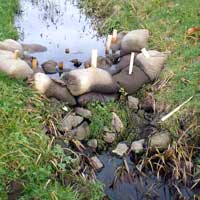 Mycology is the branch of biology devoted to the study of fungi (mushrooms), which, we’re increasingly learning, are truly astonishing in what they can do. With the support of a grant from the EPA, a team of Washington State University scientists is developing a mycofiltration system to purify storm water of bacteria before it re-enters the urban water supply. Professor Marc Beutel is an environmental engineer who has joined forces with renowned mycologist Paul Stamets of Fungi Perfecti, a research laboratory and retail company also in Washington State. Together they have completed the first phase of a study titled Mycofiltration Biotechnology for Pathogen Management, wherein they have successfully used fungi to create a “living net” to filter effluent bacteria. The project was funded by an EPA Small Business Innovative Research (SBIR) award.
Mycology is the branch of biology devoted to the study of fungi (mushrooms), which, we’re increasingly learning, are truly astonishing in what they can do. With the support of a grant from the EPA, a team of Washington State University scientists is developing a mycofiltration system to purify storm water of bacteria before it re-enters the urban water supply. Professor Marc Beutel is an environmental engineer who has joined forces with renowned mycologist Paul Stamets of Fungi Perfecti, a research laboratory and retail company also in Washington State. Together they have completed the first phase of a study titled Mycofiltration Biotechnology for Pathogen Management, wherein they have successfully used fungi to create a “living net” to filter effluent bacteria. The project was funded by an EPA Small Business Innovative Research (SBIR) award.
Certain types of fungi eat things that we would rather not have in our water supply, like bacteria. Since earlier work had strongly suggested that mycelia (networks of fungi) could be purposed for filtration, this study chose to use a really threatening pathogen, E. coli, and to test filtration under storm water runoff conditions, which in Washington State are significant. The goal was to meet current industry standards for water purification under laboratory conditions. The mycofilter had to be durable, “not significantly impacted by excessive heat, cold, saturation, or dehydration,” as well as having a robust filtration capacity.
Of the 30 varieties of fungi the team started out testing, one in particular demonstrated the characteristics they required. The process of testing involved innoculating a clump of wood chips and straw with the mycelium and subjecting it to an effluent containing the bacteria in both sediment-bound and free-floating forms. Subsequent water quality testing showed that the E. coli was virtually entirely removed. Moreover, the mycofilters were just as successful at removing the pathogen when they were reused, demonstrating the resiliency of the mycostrain.
